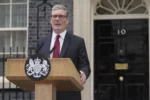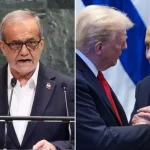
British Prime Minister Keir Starmer is “looking at” withdrawing a legal argument lodged by the United Kingdom’s previous leadership against the International Criminal Court prosecutor’s indictment of Israeli Prime Minister Benjamin Netanyahu, his office acknowledged Thursday.
“It is for the prosecutor and the court to make a decision,” a spokeswoman in Starmer’s office told British media. “Now, with regard to the previous government’s proposals around a submission, we are looking at that but I don’t have any further updates.”
Starmer, a Labour Party leader, came to power just weeks ago following a landslide election that ended 14 years of Conservative Party rule. That victory marked the culmination of a turn in Labour’s political fortunes that began in 2020 with the ouster of then-Labour leader Jeremy Corbyn, who was widely perceived as indulgent of antisemitism in the party. Yet his government also faces political pressure from left-wing pro-Palestinian voters, not unlike the dilemmas that have hampered President Joe Biden and Vice President Kamala Harris during the U.S. presidential season.
“I fully supported the U.K.’s role in defending Israel when Iran launched its unprecedented attack, and I utterly condemn the Houthi attack on Tel Aviv overnight,” British Foreign Secretary David Lammy told the House of Commons last week. “There are also those who, like me, represent constituents who are convinced that the world does not understand the depth of Palestinian suffering. … I understand both those perspectives. I recognize the pain and anguish felt on all sides. It makes me only more determined to do all I can in this office to advance the cause of peace.”

Western attempts to balance those political and policy priorities have been complicated by ICC chief prosecutor Karim Khan, who unveiled indictments of Hamas leaders paired with charges against Netanyahu and his defense minister, Yoav Gallant, in May. Khan accused the Israeli leaders of “intentionally directing attacks against a civilian population,” but Israeli officials maintain that the civilian casualties in the Gaza Strip are a consequence of Hamas’ tactics.
“Senior Hamas official Fathi Hamad … boasted that Palestinian women and children excel at being human shields,” Netanyahu said during his joint address to Congress, referring to a speech given by a Hamas leader in 2008. “They actually want Palestinian civilians to die, so that Israel will be smeared in the international media and be pressured to end the war before it’s won.”
Then-British Prime Minister Rishi Sunak denounced the indictment, in part on the grounds that “the ICC does not have jurisdiction” over Israel. His team urged the ICC’s pretrial chamber to reject Khan’s request for warrants against Netanyahu and Gallant, but Starmer’s government “is expected to drop the previous government’s objections,” according to the New York Times, which reported Starmer’s team might be “edging away from” the U.S. approach to the war.
“We reject the overall characterization in that piece,” the Starmer spokeswoman said. “The Government has been clear about Israel’s right to self-defense and its right to respond to a terror attack in line with international humanitarian law. We’ve been in lockstep with the US on this matter and also in our efforts with the US and other allies in terms of promoting regional stability.”
Biden rejected Khan’s allegations as “outrageous” in May, saying that “it’s clear Israel wants to do all it can to ensure civilian protection.” The jurisdictional dispute also has wider ramifications for other countries in disputes with the ICC.
“This is an own goal for Britain,” Foundation for Defense of Democracies senior adviser Richard Goldberg, the Trump White House National Security Council’s lead official for countering Iran’s nuclear program, told the Washington Examiner. “There’s no jurisdiction for the ICC to come after the British military let alone Israel, which is both a fellow democracy and a nonmember. Starmer may think he is appeasing a pro-Hamas base in Labour, but he’s actually putting American and British troops in the ICC crosshairs.”
CLICK HERE TO READ MORE FROM THE WASHINGTON EXAMINER
Lammy said last week that the Starmer government’s response to the ICC and demands to halt arms sales to Israel will depend on the results of a “quasi-legal process” of consultations across the government. And he signaled that the government might change course, but not as much as some leftist supporters want.
“Israel is surrounded by people who would see its annihilation — it is being attacked by the Houthis, Hezbollah are firing missiles, and Hamas want to wipe it off the map,” he said. “For those reasons, it would not be right to have a blanket ban between our countries and Israel. What is right is for me to consider in the normal way the issues in relation to offensive weapons in Gaza, following the quasi-judicial process that I have outlined.”






